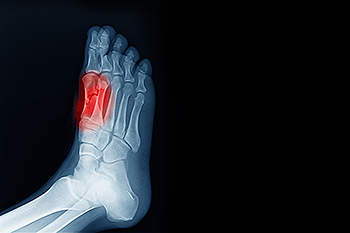All About Sesamoiditis
Tuesday, 12 July 2022 00:00
Sesamoiditis is an inflammation of two tiny bones under the big toe and the tendons they are wrapped in. Sesamoids help support your weight as it transfers to the ball of the foot when you run, dance and walk in high heels. These bones are embedded in tendons, and when they become irritated from overuse they cause inflammation, or tendonitis. Symptoms of sesamoiditis include pain under the big toe, difficulty bending the big toe, swelling, redness and sometimes bruising. Just walking can be painful. People with high arches or flat feet, who roll their foot inward when they walk, or who have gout are at risk for sesamoiditis. A podiatrist can examine your feet and test for mobility, as well as to rule out other causes of your condition, such as bone fracture or turf toe. Treatment may include steroid injections or, in chronic cases, surgery. Please consult a podiatrist for further information.
Sesamoiditis is an unpleasant foot condition characterized by pain in the balls of the feet. If you think you’re struggling with sesamoiditis, contact Dr. Ronald K. Olm of Grand Traverse Foot & Ankle Center. Our doctor will treat your condition thoroughly and effectively.
Sesamoiditis
Sesamoiditis is a condition of the foot that affects the ball of the foot. It is more common in younger people than it is in older people. It can also occur with people who have begun a new exercise program, since their bodies are adjusting to the new physical regimen. Pain may also be caused by the inflammation of tendons surrounding the bones. It is important to seek treatment in its early stages because if you ignore the pain, this condition can lead to more serious problems such as severe irritation and bone fractures.
Causes of Sesamoiditis
- Sudden increase in activity
- Increase in physically strenuous movement without a proper warm up or build up
- Foot structure: those who have smaller, bonier feet or those with a high arch may be more susceptible
Treatment for sesamoiditis is non-invasive and simple. Doctors may recommend a strict rest period where the patient forgoes most physical activity. This will help give the patient time to heal their feet through limited activity. For serious cases, it is best to speak with your doctor to determine a treatment option that will help your specific needs.
If you have any questions please feel free to contact one of our offices located in Traverse City and Kalkaska, MI . We offer the newest diagnostic and treatment technologies for all your foot and ankle needs.





